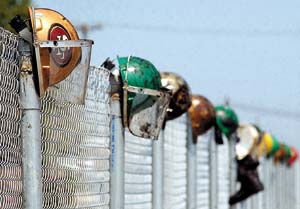GAF Leatherback Corp.’s manufacturing plant stopped building
roof materials on Aug. 10, and after weeks of cleaning up,
employees were treated to a farewell lunch on Friday. After lunch,
most of them left the plant for the last time.
Local workers have hung up their hard hats for good at one of Hollister’s largest industrial plants.
GAF Leatherback Corp.’s manufacturing plant stopped building roof materials on Aug. 10, and after weeks of cleaning up, employees were treated to a farewell lunch on Friday. After lunch, most of them left the plant for the last time.
To honor the employees’ work, hard hats were hung on the fence surrounding the property.
Mitch Cox, who manages Leatherback’s local shipping operations, said many workers have been at the company for “30-plus years.”
After another week of employment, Cox said he’ll be moving on to a similar position in Chowchilla. Other Leatherback workers haven’t been as lucky, he said, because their jobs are “very specialized.”
“I worked my way up from bottom to top,” said Cox, who started at Leatherback three years ago. “It was a little bit of hard work and a little bit of luck.”
GAF Materials Corp., the New Jersey company that owns Leatherback, announced the plant’s closure in July, citing a declining market and competitors’ growth. In a written statement, GAF said the closure had nothing to do with the “solid performance and commitment of Hollister employees.”
Forty-three Leatherback employees lost jobs as a result of the closure.
Local plant manager Brian Davis directed all questions to the corporate office in New Jersey. Staff at GAF’s media relations office said spokespeople would not be able to comment by deadline Friday.
Hollister Mayor Brad Pike said the plant’s closure is sad news for its workers, but he thinks the vacancy of around 7 acres of land near downtown Hollister may lead to some exciting commercial developments.
“My first thing is, I don’t want anybody to lose their jobs, so I feel bad for all their employees,” Pike said. “But at the same time, if (Leatherback’s) is not going to be in the community anymore, it’s going to free up opportunities.”
Those opportunities, he said, are why the city is “waiting to see” what happens to the land. And City Manager Clint Quilter said he’s “still working” to determine the fate of Leatherback’s properties.
But as Cox left the Leatherback office Friday, he didn’t talk about opportunities or new development. Instead, Cox praised his old co-workers and the bond they had formed.
“It was a hard job,” he said. “It was something that took a lot of teamwork to get it done, and that’s what we did. Everybody pulled together.”










